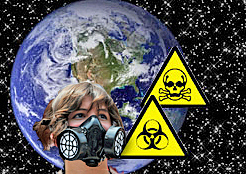|
With climate change having the potential to literally cause the extinction of the human race, the need for action is now become urgent. Rising to that fact, International Worker's Memorial Day 2024, has been themed with the need to highlight that climate change right now in 2024; is becoming one of the major causes of the death of workers.

Why you may ask? Unlike the rest of Europe, the UK workforce will not benefit from new laws being brought in to protect workers from extreme temperatures and worsening air pollution. Thatcher saw the end to H&S legislation which at that time did talk of maximum temperatures for workplaces. Our Governments and employers pay only lip service to the health, safety, and wellbeing of UK workers.
In 2023 according to the British Medical Journal:
Climate change will have deadly effects on physical and mental health if nations fail to take steps to mitigate the “emerging reality” of global warming, a new report from the UK Health Security Agency has claimed.
According to the London School of Hygiene and Tropical Medicine:
In 2022 an estimated 4,507 deaths were associated with the hottest days in England.
Professor Antonio Gasparrini of the London School of Hygiene & Tropical Medicine (LSHTM), who worked on an ONS report into deaths attributed to climate change heat rises, issued 22nd September 2023, said:
 “This is a stark warning that this will become the norm due to climate change, and it makes even more urgent the need to implement adequate climate and public health measures." “This is a stark warning that this will become the norm due to climate change, and it makes even more urgent the need to implement adequate climate and public health measures."
Here are the cold facts of the matter, which also applies to the UK in terms of the extreme weather we have also encountered, taken from a press release issued by the European Trade Union Confederation:
The number of people dying at work due to extreme heat is increasing faster in the European Union than any other part of the world, new data shows ahead of International Workers’ Memorial Day.
According to estimates provided to the European Trade Union Confederation (ETUC) by the International Labour Organisation (ILO), 80,800 people suffered injuries at work due to heat exposure in 2020 and 67 people died as a result of working in extreme heat.
It means the EU has seen a 42% increase in heat-related workplace fatalities since 2000. The ten countries with the highest increases in heat-related fatalities at work since 2000 are: Iceland, Ireland, Denmark, Czechia, Norway, Austria, Switzerland, New Zealand, Slovenia, and Slovakia.
The European Environment Agency also said in March that heatwaves in Europe have already “resulted in increased incidences of heat stroke and fatalities among outdoor workers, especially those in the agriculture, construction, street maintenance, and waste collection sectors.”
That is why the ETUC’s European election manifesto calls for EU legislation that establishes temperature limits for work to prevent workers from risk associated to climate change.
That is needed to avoid a repeat of the avoidable tragedies witnessed last summer:
- In Spain, a 60-year-old fainted and died while working in a warehouse in the town of Móstoles near Madrid died where his colleagues said the heat had reached 46°C. There were 390 heat-related work injuries recorded in 2023 and 2022 – more than the number recorded between 2010 and 2015, according to government data. The number of deaths during that period (7) was also more than was recorded between 2010 and 2017.
- In Italy, a 75-year-old crane operator, Ciro Adinolfi, died of a heart attack in front of his son while working on the construction site of an Amazon warehouse in temperatures approaching 40°C. He is one of at least five workers whose deaths last summer are linked to extreme temperatures.
- In France, 44-year-old Tony Leroy died of a heart attack while working on a building site in high temperatures. The number of heat-related work deaths increased last year and 58 people have now lost their lives at work due to heat-related injuries since 2017, according to figures from the public health authority.
- In Greece, a worker with a heart condition died at the Elefsina Shipyards after being made to work alone outside in 37°C heat. There are no official statistics but it was one of at least 10 heat-related deaths at work recorded by unions last summer.
When temperatures rise above 30°C, the risk of workplace accidents increases by 5-7% and, when temperatures exceed 38°C, accidents are between 10% to 15% more likely, shows.
Despite the increasing risk, only a few European countries have legislation to keep workers safe during heatwaves, with a wide variation in limits.
Following a campaign by ETUC, the European Commission took its first steps to protect workers from extreme heat last summer by issuing guidelines to employers.
But the rising threat shows the European Commission needs to deliver binding legislation on limits on working temperatures which ensures:
- Workers have the right to stop work and take a break in extreme heat;
- Workers have the right to a supply of drinking water, access to a shaded area and protective clothing;
- Heat risks are managed through collective bargaining with trade unions and training on how to manage heat stress for at-risk workers.
"The EU must act to protect workers from Health&Safety risks and accidents related to climate change and extreme weather conditions"
Speaking ahead of International Workers Memorial Day on April 28, ETUC Confederal Secretary Giulio Romani said:
“On International Workers Memorial Day, we remember the dead and fight for the living.
We cannot accept that every summer dozens of workers needlessly lose their lives because we have not adapted our working practices to the changing climate.
On building sites or in warehouses, people are dying or being seriously injured because they are forced to keep working in obviously dangerous temperatures.
Adapting working hours to avoid the hottest part of the day is common sense way to protect workers while maintaining productivity.
The rising number of deaths across Europe shows employers are failing to do this, which is why the Commission must make it an obligation through legislation on maximum working temperatures.”
Source:ETUC / Unionsafety
|


 “This is a stark warning that this will become the norm due to climate change, and it makes even more urgent the need to implement adequate climate and public health measures.
“This is a stark warning that this will become the norm due to climate change, and it makes even more urgent the need to implement adequate climate and public health measures.